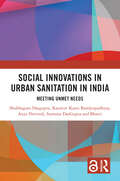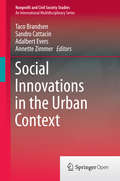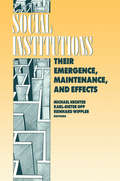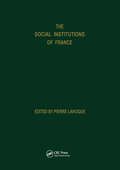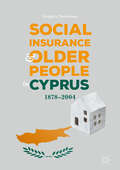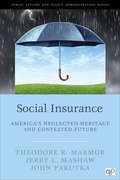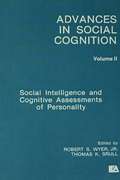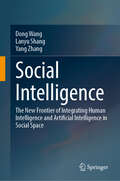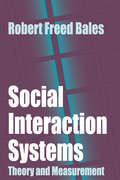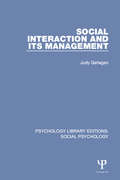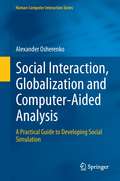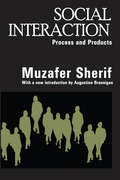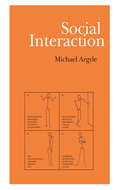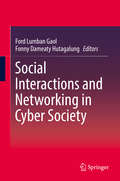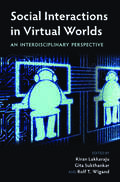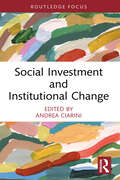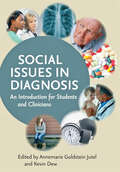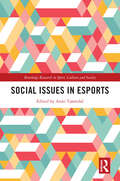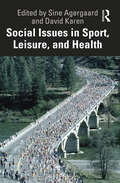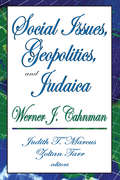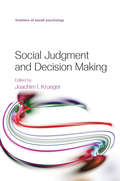- Table View
- List View
Social Innovations in Urban Sanitation in India: Meeting Unmet Needs
by Shubhagato Dasgupta Kaustuv Kanti Bandyopadhyay Anju Dwivedi Sumona Das Gupta Ms BhartiThis book discusses effective social innovation strategies facilitated by civil society organisations (CSOs) to tackle India’s significant urban sanitation challenge. It presents the contours of an ecosystem that includes citizen participation and strengthening community-managed systems for improved sanitation and public health. The book analyses case studies of effective sanitation programmes as well as experiments with innovative ideas in different regional contexts by CSOs to meet the contextual needs of the community and to ensure access to safe sanitation, especially among the urban poor. It highlights the challenges and the need for active participation of communities for change in behaviour, increasing institutional capacities of municipalities for standardising and scaling up strategies which work. The authors highlight the need for designing low-cost solutions, organising informal sanitation workers, serving marginalised communities and building effective alliances between communities and institutions to influence public policy. Rich in empirical data, this book will be useful for scholars and researchers of urban studies, public policy, governance, political science, development studies and sociology as well as for CSOs and non-governmental organisations (NGOs) working on urban sanitation, urban planning and public policy.
Social Innovations in the Urban Context
by Taco Brandsen Sandro Cattacin Adalbert Evers Annette ZimmerThis book addresses the practice of social innovation, which is currently very much in the public eye. New ideas and approaches are needed to tackle the severe and wicked problems with which contemporary societies are struggling. Especially in times of economic crisis, social innovation is regarded as one of the crucial elements needed to move forward. Our knowledge of its dynamics has significantly progressed, thanks to an abundance of studies on social innovation both general and sector-specific. However, despite the valuable research conducted over the past years, the systematic analysis of social innovation is still contested and incomplete. The questions asked in the book will be the following: 1. What is the nature of social innovations? 2. What patterns can be identified in social innovations emerging at the local level? 3. How is the emergence and spread of social innovations related to urban governance? More precisely, which conditions and arrangements facilitate and hinders social innovation? We explore these questions using different types of data and methods, and studying different contexts. In particular, we focus on innovations that aim at solving problems of the young unemployed, single parents and migrants. This analysis is based on original research carried out in the period 2010-2013 in the framework of a European project with a specific empirical research strategy. Research was carried out in 20 cities in 10 different European countries.
Social Institutions
by Karl-Dieter OppThis is the first book to present a synthesis of rational choice theory and sociological perspectives for the analysis of social institutions.The origin of social institutions is an old concern in social theory. Currently it has re-emerged as one of the most intensely debated issues in social science. Among economists and rational choice theorists, there is growing awareness that most, if not all, of the social outcomes that are of interest to explain are at least partly a function of institutional constraints. Yet the role of institutions is negligible both in general equilibrium theory and in most neoclassical economic models. There is a burgeoning substantive interest in institutions ranging from social movements, to formal organizations, to states, and even international regimes.Rational choice theorists have made great strides in elucidating the effects of institutions on a variety of social outcomes, but they have paid insufficient attention to the social dynamics that lead to the emergence of these institutions. Typically, these institutions have been assumed to be a given, rather than considered as outcomes requiring explanation in their own right. Sociological theorists, in contrast, have long appreciated the role of social structural constraints in the determination of outcomes but have neglected the role of individual agents.Michael Hechter is professor emeritus in the department of Sociology at the University of Washington. He is the author of numerous books. He became an Elected Fellow to the American Academy of Arts and Sciences in 2004 and has been featured in Who's Who. He is also currently on editorial boards for a numerous amount of journals.Karl-Dieter Opp is professor of sociology at Univesitat Leipzig. He has been a Fellow of the European Academy of Sociology since 1999 and has been member of the Council and Treasurer since 2000. He is also current on the advisory board for the magazine Mind and Society.Reinhard Wippler is professor of theoretical sociology at the University of Utrecht and scientific director of the Interuniversity Center for Sociological Theory and Methodology.
Social Institutions Of France
by Patricia Evans Roy Evans Pierre Laroque P. LaroqueFirst Published in 1983. Social problems have assumed a growing importance in France, as in all developed countries, especially since the end of the last century. While traditional early nineteenth century liberalism denied the existence of social problems as such, believing the greatest possible economic freedom to be the sole solution to all evils, the emphasis is still placed more and more insistently on the need for a definite and concerted welfare effort, to increase the material well-being of individuals and families. Since the second edition of this book was published in 1962, legislation and welfare services, and social reality itself have changed as much through circumstances as through political and economic evolution. It follows that the present edition of this book is, in fact, an almost wholly new book. It attempts to present a comprehensive view of French social life, drawing attention especially to welfare services and legislation as they are at the beginning of 1979.
Social Insurance and Economic Security (Prentice-hall Series In Security And Insurance)
by George E. RejdaThis classic social insurance work has been updated to cover a decade of policy developments and the impact of the recent economic crisis.The book includes in-depth discussion of all major programs to reduce economic insecurity in the United States, including Social Security, Medicare, workers' compensation, unemployment compensation, and temporary disability insurance. The principles, characteristics, and policy issues associated with social insurance and public assistance programs are discussed in detail. The book examines each major cause of economic insecurity and analyzes the appropriate social insurance program for dealing with the problem.
Social Insurance and Older People in Cyprus: 1878–2004
by Gregory NeocleousThis book explores and analyses the evolution of social insurance in Cyprus from 1878, beginning with the arrival of the British after 300 years of Ottoman occupation. Neocleous follows the struggles of the labour movement which raised the issue of social insurance and initiated the campaign for its introduction in Cyprus. The book also evaluates the social conditions of the general population, with particular emphasis on older people, including a detailed study and analysis of their role and the movement for improved pensions. Taking into account historical sources, sociological theory, and anthropological concepts, this discourse is embedded within a rich historical framework, as well as an integration of the most contemporary scholarship in the field.
Social Insurance: America’s Neglected Heritage and Contested Future (The Institution for Social and Policy Studies )
by Jerry L. Mashaw Theodore R. Marmor John R. PakutkaWhat has America done to protect its citizens from life-changing but common risks such as death of a family breadwinner, ill health, disability, involuntary unemployment, outliving retirement savings, and birth into a poor family? Each, in its own way, burdens—and possibly devastates—unlucky individuals and families both emotionally and financially. It is the rare life that is untouched by one or more of these six threats. How do our current policies affect taxation, spending, and the economy, as well as prospects for individual lives? What more might these policies do to protect Americans? Rich in stories, data, and analysis, Social Insurance provides a strong intellectual foundation for understanding the history, economics, politics, and philosophy of America’s most important social insurance programs. This insightful work provides a unifying vision of these programs’ purposes and reminds us, amidst the confusing and often apocalyptic rhetoric, why we have the programs and policies we do, while arguing for reforms that preserve and enhance the protections in place.
Social Integration and Intermarriage in Europe: Islam, Partner-Choices and Parental Influence (Research In Migration And Ethnic Relations Ser.)
by Sarah CarolIntergroup friendships and marriages are regarded as the most important indicators of immigrants’ social integration, as they represent the most intimate ties that can exist between minority and majority group members. Drawing on unique, large-scale, cross-national survey data, encompassing natives as well as Turkish, Moroccan, Pakistani and ex-Yugoslav migrants across several Western European countries, this book offers extensive analyses of intermarriage, as well as attitudes towards intermarriage and intergroup dating in general. Conceptualising the willingness or otherwise to marry outside one’s ethnic or religious group in terms of social distance, Social Integration and Intermarriage in Europe provides new evidence that different conceptions of family life, gender relations and religiosity are crucial for understanding why individuals can be reluctant to engage in intergroup relationships. With attention to the question of the role played by state policies in explaining immigrant social integration, the book explores differences across Western Europe and the ways in which each state regulates immigration and the accommodation of Islam. A detailed and rigorous study of attitudes to intermarriage, social integration and the role of the state, Social Integration and Intermarriage in Europe will appeal to policy makers and scholars of within the social sciences, with interests in migration, interethnic relations and social integration.
Social Intelligence and Cognitive Assessments of Personality: Advances in Social Cognition, Volume II (Advances in Social Cognition Series)
by Robert S. Wyer Jr. Thomas K. SrullThis volume presents a new conceptualization of personality and social cognition that addresses both traditional and new issues. Written for students of personality, experimental and consumer psychology and cognitive science.
Social Intelligence: The New Frontier of Integrating Human Intelligence and Artificial Intelligence in Social Space
by Yang Zhang Dong Wang Lanyu ShangGiven the rise of AI and the advent of online collaboration opportunities (e.g., social media, crowdsourcing), emerging research has started to investigate the integration of AI and human intelligence, especially in a collaborative social context. This creates unprecedented challenges and opportunities in the field of Social Intelligence (SI), where the goal is to explore the collective intelligence of both humans and machines by understanding their complementary strengths and interactions in the social space. In this book, a set of novel human-centered AI techniques are presented to address the challenges of social intelligence applications, including multimodal approaches, robust and generalizable frameworks, and socially empowered explainable AI designs. The book then presents several human-AI collaborative learning frameworks that jointly integrate the strengths of crowd wisdom and AI to address the limitations inherent in standalone solutions. The book also emphasizes pressing societal issues in the realm of social intelligence, such as fairness, bias, and privacy. Real-world case studies from different applications in social intelligence are presented to demonstrate the effectiveness of the proposed solutions in achieving substantial performance gains in various aspects, such as prediction accuracy, model generalizability and explainability, algorithmic fairness, and system robustness.
Social Interaction Systems: Theory and Measurement
by Robert BalesSocial Interaction Systems is the culmination of a half century of work in the field of social psychology by Robert Freed Bales, a pioneer at the Department of Social Relations at Harvard University. Led by Talcott Parsons, Gordon W. Allport, Henry A. Murray, and Clyde M. Kluckhohn, the Harvard Project was intended to establish an integrative framework for social psychology, one based on the interaction process, augmented by value content analysis. Bales sees this approach as a personal involvement that goes far beyond the classical experimental approach to the study of groups.Bales developed SYMLOG, which stands for systematic multiple level observation of groups. The SYMLOG Consulting Group approach was worldwide as well as interactive. It created a data bank that made possible a search for general laws of human interaction far beyond anything thus far known. In his daringsearch for universal features, Bales redefines the fundamental boundaries of the field, and in so doing establishes criteria for the behavior and values of leaders and followers. Bales offers a new "field theory," an appreciation of the multiple contexts in which people live.Bales does not aim to eradicate differences, but to understand them. In this sense, the values inherent in any interaction situation permit the psychologist to appreciate the sources of polarization as they actually exist: between conservative and liberal, individualistic and authoritarian, libertarian and communitarian. Bales repeatedly emphasizes that the mental processes of individuals and their social interactions take place in systematic contexts which can be measured. Hence they permit explanation and prediction of behavior in a more exact way than in past traditions. Bales has offered a pioneering work that has the potential to move us into a new theoretical epoch no less than a new century. His work holds out the promise of synthesis and support for psychologists, sociologists, and all who work with groups and organizations of all kinds.
Social Interaction and its Management (Psychology Library Editions: Social Psychology)
by Judy GahaganOriginally published in 1984, this book is concerned with our everyday behaviour with other people. It examines the nature of social interaction and the resources utilized in our engagement with others, and the ways in which these processes may be controlled and resources improved. Two themes are central to the book. One is the relationship between the intuitive psychology of everybody and the psychology of the professional scientist. The other is the shift in practice from the professional as expert and controller of the therapeutic processes towards self-management by the client. This is an essential guide for both students and professionals, and for anyone who would like to bring their social processes under more control.
Social Interaction, Globalization and Computer-Aided Analysis
by Alexander OsherenkoTackling globalization is a great challenge - it is both extremely beneficial and essentially problematic. This comprehensive, multidisciplinary study confronts this ambivalence through the use of computer simulation. It discusses the findings of social interaction and social simulation through the use of understandable global examples. Readers can use this book as a tool to outline significant aspects of intercultural simulation and highlight the issues that need to be considered in the reader's analysis. The author leads the reader via sequential narration from a colloquial description of intercultural situations to final simulation prototypes; each step is accompanied by descriptive comments and program code. Social Interaction, Globalization and Computer-aided Analysis shows the reader how to acquire intercultural data from seemingly inconceivable information sources. Researchers and software developers engaged in interdisciplinary research projects in the field of Human-Computer Interaction will find this book to be a useful companion in their work. Alexander Osherenko is the founder of the start-up company Socioware Development, which implements psychologically-, sociologically- and culturally-aware software that scrutinizes information based on the findings of the cognitive sciences. Solutions created by Socioware Development can be implemented across a vast spectrum of industries, including car manufacturing, insurance and banking, Internet search engines and e-retailers.
Social Interaction: Process and Products
by Muzafer SherifReflecting the many contributions of Muzafer Sherif to social psychology during the past thirty years, this volume presents selections from among Sherif's most widely known essays and provides a systematic overview of his evolving interests, concepts, methods and research findings. Twenty-five essays are divided into five sections according to content; the theoretical and methodological problems at the heart of Sherif's work; the experimental model for interaction process and products; problems of self and reference groups; concepts, attitudes and ego-involvements; and contributions to problems of in-group and intergroup relations through experimental and field research. Though the selections range over a broad spectrum each is characterized by the precise and incisive work techniques Sherif devised as well as by its intrinsic relevance to significant issues. Sherif writes to clarify theory, to define conceptual tools, and to use tools and theory to demonstrate the substantive results of his researches. Each research finding is added to its predecessors as the author advances to his goal of a social psychology that is consistent as it moves from the most basic psychological processes to the complexities of individual involvement in collective activity
Social Interaction: Process and Products (Social Science Paperbacks Ser.)
by Michael ArgyleThis is the first book-length work to reflect the recent trend in social psychology away from artificial laboratory test results. It focuses directly on the detailed, concrete elements of social behavior as they are observed in a real-life setting. Michael Argyle's approach here differs from that more generally taken in two respects. First, he discusses human interaction in terms of the basic elements of behavior-bodily and facial movements, gestures, eye-movements, facial expression, proximity, and orientation, the verbal and non-verbal aspects of communication. Second, he has drawn on research in such varied areas as psychiatry, anthropology, linguistics, ethology, developmental and organizational psychology, as well as on his own extensive experimental studies. Particular emphasis is given to the biological roots of interaction, and to its cultural setting. Social Interaction demonstrates a strong awareness of the current theories of social psychology, while restricting itself in exposition to the observable aspects of human interaction. The result is a comprehensive and stimulating introduction to social interaction. This is primarily a textbook for students of social psychology, but it covers a field that is of central importance for all students of the social and biological sciences.
Social Interactions and Networking in Cyber Society
by Ford Lumban Gaol Fonny Dameaty HutagalungThis book discusses the interactions between societies and examines how people behave in the cyber world. It highlights the effects of the Internet on individuals' psychological well-being, the formation and maintenance of personal relationships, group memberships, social identity, the workplace, the pedagogy of learning and community involvement. The book also explores in-depth the unique qualities of Internet technologies and how these have encouraged people to interact across communities. It is a valuable resource for academics, practitioners and policy makers who want to understand the capabilities of Internet technologies and their impacts on people's lives.
Social Interactions in Virtual Worlds: An Interdisciplinary Perspective
by Rolf T. Wigand Gita Sukthankar Kiran LakkarajuWithin the rapidly-growing arena of 'virtual worlds', such as Massively Multiplayer Online Games (MMOs), individuals behave in particular ways, influence one another, and develop complex relationships. This setting can be a useful tool for modeling complex social systems, cognitive factors, and interactions between groups and within organizations. To study these worlds effectively requires a cross-disciplinary approach that integrates social science theories with big data analytics. This broad-based book offers a comprehensive and holistic perspective on the field. It brings together research findings from an international team of experts in computer science (artificial intelligence, game design, and social computing), psychology, and the social sciences to help researchers and practitioners better understand the fundamental processes underpinning social behavior in virtual worlds such as World of Warcraft, Rift, Eve Online, and Travian.
Social Investment and Institutional Change (Social Welfare Around the World)
by Andrea CiariniThis book focuses on the main institutional changes affecting the Social Investment approach as the framework for the European social agenda. The contributions gathered address these issues from different angles, placing two fundamental issues at the centre of the analysis. The first concerns the promotion of the strategic actions of European institutions and the national governments aimed at making social investment a recovery priority in the Eurozone. The second aims to make the social investment approach compatible not only with a high road to growth, as it is in the Stock-Flow-Buffer scheme, but also with the right to balance market and non-market activities as a universal right linked to a different combination of working and living time. It will be of interest to all scholars and students of social policy and European politics.
Social Isolation in Modern Society (Routledge Advances in Sociology #Vol. 19)
by Roelof Hortulanus Anja Machielse Ludwien MeeuwesenSocial isolation has serious repercussions for people and communities across the globe, yet knowledge about this phenomenon has remained rather limited – until now. The first multidisciplinary study to explore this issue, Social Isolation in Modern Society integrates relevant research traditions in the social sciences and brings together sociological theories of social networks and psychological theories of feelings of loneliness. Both traditions are embedded in research, with the results of a large-scale international study being used to describe the extent, nature and divergent manifestations of social isolation. With a new approach to social inequality, this empirically based study includes concrete policy recommendations, and presents a clear insight into personal, social and socio-economic causes and the consequences of social isolation.
Social Issues in China: Gender, Ethnicity, Labor, and the Environment
by Zhidong Hao Sheying ChenSince 1978, the opening up and reform in China has brought tremendous economic and social changes. While China's economic progress has been commendable, the social problems that go with economic changes have raised serious concerns. Some of those concerns are related to gender, ethnic, labor, and environmental issues. This book is about what has happened in these arenas in China since the opening up and reform in 1978. The study of gender, ethnicity, labor, and environment touches on some of the fundamental problems of modernization, especially the development of individuals and groups. So even though gender, ethnicity, labor, and environment seem to be separate issues, they are in fact related in some fundamental ways. That's what this book will explore as well. To understand is one thing and to do is another. This book also incorporates studies of NGO practices to see how NGOs have helped in transforming gender, ethnic, labor, and environment interplay. Our study of NGOs in helping improve such interplay sheds light on how specifically civil society can prod the state to transform social relations for the better. This book is an attempt to assess the changes, both positive and negative, in gender, ethnic, ethnic, and environmental relations in China especially in the past 30 years of opening up and reform, especially regarding national identity formation.
Social Issues in Diagnosis: An Introduction for Students and Clinicians
by Annemarie Goldstein Jutel and Kevin DewUnderstanding the social process of diagnosis is critical to improving doctor-patient relationships and health outcomes.Diagnosis, the classification tool of medicine, serves an important social role. It confers social status on those who diagnose, and it impacts the social status of those diagnosed. Studying diagnosis from a sociological perspective offers clinicians and students a rich and sometimes provocative view of medicine and the cultures in which it is practiced. Social Issues in Diagnosis describes how diagnostic labels and the process of diagnosis are anchored in groups and structures as much as they are in the interactions between patient and doctor.The sociological perspective is informative, detailed, and different from what medical, nursing, social work, and psychology students—and other professionals who diagnose or work with diagnoses—learn in a pathophysiology or clinical assessment course. It is precisely this difference that should be integral to student and clinician education, enriching the professional experience with improved doctor-patient relationships and potentially better health outcomes.Chapters are written by both researchers and educators and reviewed by medical advisors. Just as medicine divides disease into diagnostic categories, so have the editors classified the social aspects of diagnosis into discrete areas of reflection, including• Classification of illness• Process of diagnosis• Phenomenon of uncertainty• Diagnostic labels• Discrimination• Challenges to medical authority• Medicalization• Technological influences• Self-diagnosisAdditional chapters by clinicians, including New York Times columnist Lisa Sanders, M.D., provide a view from the front line of diagnosis to round out the discussion. Sociology and pre-med students, especially those prepping for the new MCAT section on social and behavioral sciences, will appreciate the discussion questions, glossary of key terms, and CLASSIFY mnemonic.
Social Issues in Esports (Routledge Research in Sport, Culture and Society)
by Anne TjønndalThis book provides important new insights into social issues in the rapidly growing field of esports, filling a gap in the literature that has, until now, been dominated by business and management perspectives. Bringing together leading esports experts from Europe, North America and Australia, the book provides new sociological analyses that define and locate esports in social studies. It explores key issues in esports, and in the wider sociology of sport, including gender equity, diversity, cheating and doping, physical and mental health, and issues related to the governance of esports. Presenting new empirical research alongside critical, theoretical perspectives, the book addresses themes such as digitalisation, technology, equality, innovation and welfare, suggesting directions for future research and highlighting implications for practice and development in the esports industry. This is essential reading for advanced students, researchers and practitioners working in esports, the sociology of sport, gaming studies, media studies, sociology, or the interaction of ICT and wider society.
Social Issues in Sport, Leisure, and Health
by David Karen Sine AgergaardThis book examines how social issues shape and influence our engagement with sport, leisure time physical activity, and health-promoting exercise. Connecting the personal with the public, it helps the reader understand how individual exercise, leisure, and sport participation are both facilitated and constrained by their social contexts. Presenting a series of in-depth descriptions of grassroots sport, urban lifestyle sport, physical activity across the life course, sport for children with special needs, and the development of creative climates in sport, this book seeks to encourage what C. Wright Mills described as the “sociological imagination”. Every chapter begins with an individual-level account centred on everyday challenges with accessing sport, partaking in leisure activities, and meeting guidelines for daily exercise before exploring the larger, socially determined patterns in which those experiences are located, establishing a vital template for the social scientific study of sport, leisure, and health. Touching on key contemporary themes including diversity, inclusion, health inequalities, and physical inactivity, as well as selection and intensification in sports, this book offers new case material and theoretical tools for understanding the relationships between sport, leisure, health, and the wider society. This is an indispensable companion for any course on the sociology of sport, exercise, leisure, or physical activity and health.
Social Issues, Geopolitics, and Judaica
by Zoltan Tarr Werner J. Cahnman Judith T. MarcusThis volume brings together thirty-four essays and ar- ticles by Werner J. Cahnman representing four decades (1940-1980) of work by an extraordinary, multidisciplinary scholar. Cahnman's work encompasses the experiences of a German Jewish refugee, an economist turned sociologist, and a scholar of Judaism. Part 1 contains personal and autobiographical writings and includes analyses of the cultural ambiguities of Jewish assimilation in Germany and Austria. Part 2 is devoted to sociological essays ranging from a critical assessment of Gunnar Myrdal's landmark study of the problems of race and democracy, An American Dilemma, to a probing look at the stigma of obesity, based on empirical research, a subject very much in the news today and that shows Cahnman ahead of his time. Part 3 offers some of Cahnman's most perceptive essays dealing with geopolitical themes. Included are theoretically based writings that help to clarify the methods and concepts of geopolitics, marking the intellectual beginnings of the global approach to world affairs. Here Cahnman broached the possibility of a united Europe (1944), realized sixty years later in the formation of the European Union. The twelve essays of Part 4 return to Cahnman's ever-present concern with Jews and Judaism. They present a wide-ranging historical-sociological view, from the Jews of Vienna in the 1930s to the American scene in the 1960s, to the still-unresolved problematics of Arab-Israeli relations, with Cahnman arguing for coexistence and a two-state solution for Jews and Arabs. The volume, carefully selected and assembled by the editors, presents for the first time essays representing the full range of Werner Cahnman's scholarship and thought. It will be of interest to students of sociology, history, political science, and Judaic studies.
Social Judgment and Decision Making (Frontiers of Social Psychology)
by Joachim I. KruegerThis volume brings together classic key concepts and innovative theoretical ideas in the psychology of judgment and decision-making in social contexts. The chapters of the first section address the basic psychological processes underlying judgment and decision-making. The guiding question is "What information comes to mind and how is it transformed?" The second section poses the question of how social judgments and decisions are to be evaluated. The chapters in this section present new quantitative models that help separate various forms of accuracy and bias. The third section shows how judgments and decisions are shaped by ecological constraints. These chapters show how many seemingly complex configurations of social information are tractable by relatively simple statistical heuristics. The fourth section explores the relevance of research on judgment and decision making for specific tasks of personal or social relevance. These chapters explore how individuals can efficiently select mates, form and maintain friendship alliances, judiciously integrate their attitudes with those of a group, and help shape policies that are rational and morally sound. The book is intended as an essential resource for senior undergraduates, postgraduates, researchers, and practitioners.
